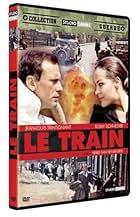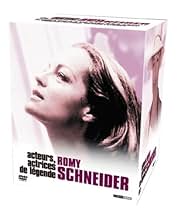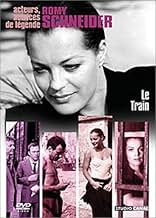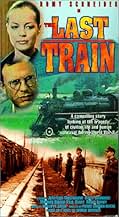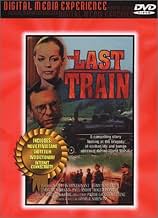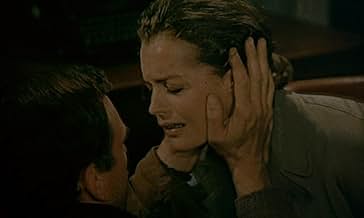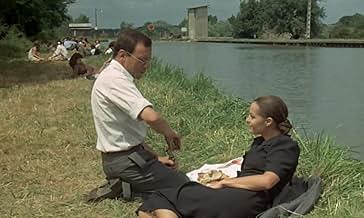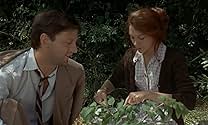CALIFICACIÓN DE IMDb
6.9/10
1.9 k
TU CALIFICACIÓN
Dos personas, el francés Julie Maroyeur, y la judía alemana Anna Kupfer, se conocen en un tren mientras escapan de Alemania para ir a Francia.Dos personas, el francés Julie Maroyeur, y la judía alemana Anna Kupfer, se conocen en un tren mientras escapan de Alemania para ir a Francia.Dos personas, el francés Julie Maroyeur, y la judía alemana Anna Kupfer, se conocen en un tren mientras escapan de Alemania para ir a Francia.
- Dirección
- Guionistas
- Elenco
- Premios
- 1 nominación en total
Opiniones destacadas
In th seventies,Granier-Deferre became the "cinema De Qualité " director par excellence ;more accessible and less pretentious than Claude Sautet after "Max Et Les Ferrailleurs " ,his career really began in the early sixties with two estimable movies with Jean Gabin ("La Horse" and "Le Chat"),he continued with craftsman works such as "La Veuve Couderc" or "Le Train" ,both Georges Simenon's books transferred to the screen.
It may explain the "detective story" ending,which may seem a bit irrelevant in a realistic movie,but it is saved by the talent of the two principals,Schneider and Trintignant,injecting more emotion into the scene than you might think possible.
This is an apt title,for most of the movie takes place on a train,a train full of people running away from the German armies in 1940 (the beginning recalls René Clément's "Jeux Interdits" (1952).The screenwriters made no bones about criticizing French cowardliness and selfishness;it was before "Lacombe Lucien" to be precise ;As the character played by Maurice Biraud remarks :"we're afraid,we are fleeing,so we don't fight each other,get it?" On the train,the characters are stereotypes,particularly the hooker played by Regine ,probably inspired by Maupassant's "Boule De Suif",the unwed mother (oddly portrayed by cerebral (who said tedious?) Anne Wiazemsky,two sex maniacs ("when I look at you (the whore),I look like a beast !- even when you don't!);the Jewish German (Schneider),the average man (Trintignant).
An user complained that this man in the street should leave his pregnant wife and his little girl for a while and sleep with the German woman:in a world gone mad,anything can happen ,it would never have happened,had this electrician continued his routine life .
Following René Clément's steps in "Jeux Interdits" ,GD smartly integrates black and white archives films which ,with a careful editing ,turn color when the director returns to his fiction.Which his predecessor was not able to do.
It may explain the "detective story" ending,which may seem a bit irrelevant in a realistic movie,but it is saved by the talent of the two principals,Schneider and Trintignant,injecting more emotion into the scene than you might think possible.
This is an apt title,for most of the movie takes place on a train,a train full of people running away from the German armies in 1940 (the beginning recalls René Clément's "Jeux Interdits" (1952).The screenwriters made no bones about criticizing French cowardliness and selfishness;it was before "Lacombe Lucien" to be precise ;As the character played by Maurice Biraud remarks :"we're afraid,we are fleeing,so we don't fight each other,get it?" On the train,the characters are stereotypes,particularly the hooker played by Regine ,probably inspired by Maupassant's "Boule De Suif",the unwed mother (oddly portrayed by cerebral (who said tedious?) Anne Wiazemsky,two sex maniacs ("when I look at you (the whore),I look like a beast !- even when you don't!);the Jewish German (Schneider),the average man (Trintignant).
An user complained that this man in the street should leave his pregnant wife and his little girl for a while and sleep with the German woman:in a world gone mad,anything can happen ,it would never have happened,had this electrician continued his routine life .
Following René Clément's steps in "Jeux Interdits" ,GD smartly integrates black and white archives films which ,with a careful editing ,turn color when the director returns to his fiction.Which his predecessor was not able to do.
I saw the film especially as admirer of Romy Schneider. I was seduced , again, by her presence and the close ups serve , in beautiful way, this cause. Her Anne , defined by bad experiences, becoming part of a story of survive and one of love, proposing a manner to resist to pressures and fears, educated , in some measure, in some form, a simple man, losting, for a period, his family, is just fair.
A war film , a trip , in the womb of a train under attacks of Nazi airplanes, a splendid scene about persecution against Jews , a great portraits of characters and inspired - dramatic end.
A beautiful film about experiences, love, refuges and radical decisions . And admirable job of Romy Schneider and Jean Louis Trintignant.
A war film , a trip , in the womb of a train under attacks of Nazi airplanes, a splendid scene about persecution against Jews , a great portraits of characters and inspired - dramatic end.
A beautiful film about experiences, love, refuges and radical decisions . And admirable job of Romy Schneider and Jean Louis Trintignant.
two great actors. subtle revelation of each role nuance. a touching beautiful war film. a delicate precise work. and little more. because its virtue is honest courage to present not only a love story in war time but to describe, softly, a tragedy of many people. lost of houses for preserve life. cruelty as manner to survive. need of the other not only as protection but like proof of your existence. a woman. and a man. the waters of sentimental link. strange beauty of Romy Schneider and the drawing of a man out of his universe presented by Jean Louis Trintignant. the silence. the crumbs of words. the silence. and last meeting. as seed for new dimension of life. that is all.
... one of Hollywood's favourite blends. Luckily, this is not a Hollywood movie but a french one; luckily, its bitter realism wins over the sweet moving moments in one of the best-acted cinematic love stories ever. Romy Schneider and J.-L. Trintignant give a performance you won't forget even when you have forgotten most details and plot elements of this simple, but convincing film.
Le train, directed by Pierre Granier-Deferre, is one of the most unknown WWII films ever made, even though it is based on a somewhat famous novel by Georges Simenon. However, Deferre wasn't interested in making a loyal adaption and especially the end differs from the original story a lot. Therefore, Deferre faced criticism and his film has sunk into oblivion, or at least in most cases, for it still has an honorable cast: Jean-Louis Trintignant (who has worked with Krzysztof Kieslowski, Francois Truffaut, Eric Rohmer and Bernardo Bertolucci), Romy Schneider (who had worked with Luchino Visconti and Orson Welles), in the leading roles; and one name worth mentioning is, as a supporting actress: Anne Wiazemsky (who has worked with Robert Bresson and Jean-Luc Godard, just to name a few).
The story starts from the summer of 1940 when a French man, Julien must leave his hometown, by train, with his wife and daughter because of the forthcoming Nazi army. In the train, Julien's wife and daughter are put to a carriage which is reserved for women, children and the elderly. In the result of this, Julien must go alone to the last carriage where he meets a group of people and notes a mysterious, Jewish German woman, Anna -- wonderfully interpreted by Romy Schneider. The film mainly focuses on their relationship and the journey to the unknown from the perspective of the last carriage.
It is a certain road-movie about a train travel during which people steal food, wash up and go to picnics. To observe war, from the perspective of a train and its people, is extremely intriguing, to say the least. For isn't train truly the milieu of our subconsciousness? In the train, our heroes are traveling to their indeterminate tragic destination, characterized by a wistful musical score. The essential idiocy of war is most clearly seen in a scene, where a group of soldiers come rampaging to the train and only succeed to, accidentally, shoot their own soldier's foot.
Le train depicts an escape from occupied France where, in turn, Francois Truffaut's The Last Metro depicts the survival and life in the occupied France. However, the connection between these two titles is entirely unintentional. The biggest flaws of Le train are in its conventional dramaturgy but it still manages to be an original film. The detailed cinematography is almost documentary-like with close-ups of train tracks; scenes of sexual intercourse, eating and washing up. Furthermore, the strength of the film is in the director's luminous idealism and faith in the force of love.
The film uses both newsreel footage and dramatizations; combines fact and fiction, like all historical films and throws the reality of war in front of our eyes. This combination means strong signal of memory; and the eternal relation between past and presence. History has always been an inexhaustible source of political rhetoric and Le train is, in fact, a leftist war film but, what is more, it achieves to relay a timeless and universal emotion of a time when man must lose his humanity, in order to survive. During times like this, moments of child-like joy are brief and transient. During times like this, it is important to love -- which might just be the thesis of this bittersweet film.
The story starts from the summer of 1940 when a French man, Julien must leave his hometown, by train, with his wife and daughter because of the forthcoming Nazi army. In the train, Julien's wife and daughter are put to a carriage which is reserved for women, children and the elderly. In the result of this, Julien must go alone to the last carriage where he meets a group of people and notes a mysterious, Jewish German woman, Anna -- wonderfully interpreted by Romy Schneider. The film mainly focuses on their relationship and the journey to the unknown from the perspective of the last carriage.
It is a certain road-movie about a train travel during which people steal food, wash up and go to picnics. To observe war, from the perspective of a train and its people, is extremely intriguing, to say the least. For isn't train truly the milieu of our subconsciousness? In the train, our heroes are traveling to their indeterminate tragic destination, characterized by a wistful musical score. The essential idiocy of war is most clearly seen in a scene, where a group of soldiers come rampaging to the train and only succeed to, accidentally, shoot their own soldier's foot.
Le train depicts an escape from occupied France where, in turn, Francois Truffaut's The Last Metro depicts the survival and life in the occupied France. However, the connection between these two titles is entirely unintentional. The biggest flaws of Le train are in its conventional dramaturgy but it still manages to be an original film. The detailed cinematography is almost documentary-like with close-ups of train tracks; scenes of sexual intercourse, eating and washing up. Furthermore, the strength of the film is in the director's luminous idealism and faith in the force of love.
The film uses both newsreel footage and dramatizations; combines fact and fiction, like all historical films and throws the reality of war in front of our eyes. This combination means strong signal of memory; and the eternal relation between past and presence. History has always been an inexhaustible source of political rhetoric and Le train is, in fact, a leftist war film but, what is more, it achieves to relay a timeless and universal emotion of a time when man must lose his humanity, in order to survive. During times like this, moments of child-like joy are brief and transient. During times like this, it is important to love -- which might just be the thesis of this bittersweet film.
¿Sabías que…?
- TriviaAs Granier-Deferre had been part of the Exodus (at the age of 13), he was able to add a lot of personal observations to his description of the flight (such as people remaining cheerful despite the tragedy of the situation, nuns picking flowers in a field during a bombing raid, ...)
- ConexionesFeatured in Romy, femme libre (2022)
- Bandas sonorasL'Attaque
Written and Performed by Philippe Sarde Et Orchestre
Selecciones populares
Inicia sesión para calificar y agrega a la lista de videos para obtener recomendaciones personalizadas
- How long is The Last Train?Con tecnología de Alexa
Detalles
- Fecha de lanzamiento
- Países de origen
- Idioma
- También se conoce como
- The Last Train
- Locaciones de filmación
- Saincaize-Meauce, Nièvre, Francia(mined railroad bridge)
- Productoras
- Ver más créditos de la compañía en IMDbPro
- Tiempo de ejecución
- 1h 35min(95 min)
- Color
- Mezcla de sonido
- Relación de aspecto
- 1.66 : 1
Contribuir a esta página
Sugiere una edición o agrega el contenido que falta

